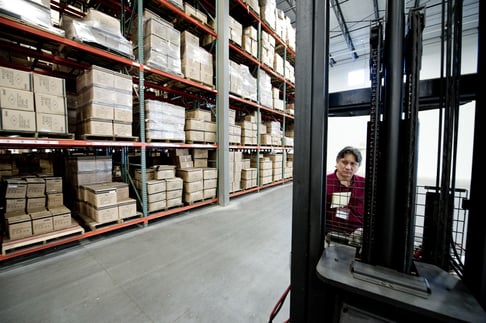
A wise human would have an understanding of the supply chain and how the pieces fit together. But it's against our nature to think about it. - Paola Bacigalupi
There are many reasons to outsource warehousing. The reasons differ depending on the type of industry and business, but the root of the decision is typically based on a need to improve the efficiency and effectiveness of an operation. This is why choosing the right warehousing provider (operational support or space) is important. If your provider isn't the right fit for your company, it can cause more problems than it provides solutions.
Here are some tips to help you pick the best warehousing provider for your company.
Information
Ease of access to information is critical to modern business. The ability to access data and turn it into business intelligence is key to the success and efficiency of a company, and it's typically achieved in warehousing and manufacturing by investing in technology. A company that has invested in their technological infrastucture is a company that will help your operations run much more smoothly. What's the reason? It's because their software provides more visibility to your supply chain.
When choosing a provider for your company, make sure to ask questions like these:
- Does your company offer client portals?
- Does your company's WMS support API intergrations?
- Is the software simple and easy to use?
- Is the software accessible from mobile devices?
- Does your software send alerts when certain KPIs reach below a certain threshold?
Location
What's the first rule of buying real estate? Location. Location. Location. While you aren't buying real estate in this instance, the logic is the same. Picking a location that is strategically near the end destination of your shipments will save time and, more importantly, money, so take this into account when selecting a warehouse provider. It is also a wise decison to go with a provider that has multiple warehouse locations. It speaks to the vibrance of their business.
Speciality
The nuances of diffent businesses and industries sometimes require a specialist - a provider who understands the rules and regulations of the industry, as well as the correct way to store and handle the product. You might also require a specialist who has the correct certification and standards for warehousing. For example, food-grade products fall under many strict government regulations. This requires that your warehouse provider obtain a specific type of certification and maintain a certain standard of the warehouse and operations in order to stay eligible.
Take this all into account when making your choice. You should ask questions like this during the inital inquiry to the provider. If they answer "no," you're wasting your time.
Condition
The condition of the warehouse is important. You don't want your product stored in a warehouse that is not properly sealed from the elements, or has water leaking from the air conditioning ducts, right?
It's important to put your own eyes on the facility. Request a tour of the facility that will house your product.
Here is what you should look for:
- The cleanliness of the facility
- The way that the product has been stacked or stored
- How organized are their bays (the area where goods are loaded on/off a vehicle)?
- Are the warehouse and aisle markers visible?
- Pay attention to their inbound and outbound processes
- Do they seem to perform cycle counts?
Scalability
Work with a warehouse vendor who has the ability to scale with your needs. The vendor you pick should be able to align with the growth plans of your company. If not, you run the risk of starting with a company that fits your needs at the beginning but is no longer a match a couple of years later. Continuity with warehouse providers is great and should last for while. Hopping from one provider to the next is not good practice.
A vendor that can scale with your needs is important. Ask them questions about their own growth plans.
Quality
Low cost and excellent service typically don't go together. Many warehouse providers believe in paying their warehouse workers low wages. Consequently, they have low quality talent. Providers who pay higher wages are able to pouch the talented workers.
How does this apply to you? It means that their operation probably has a lot of waste. Due to the low quality talent, it takes more workers to do the same job. You'll also encounter unmotivated workers who handle the product carelessly. This means that you will begin to see damaged product. All of these hidden expenses add up. The provider may quote you the lowest price on the front-end but you will likely see true impact with overtime hours and cost of replacing damaged product.
Take this into account when you make your decision. The decision should not be based solely on price.
Service
Investment
Do they invest in their company and infrastructure?
Does this company have old and damaged equipment or is it new and modern?
A provider that consistently invests in the company and tries to find ways to improve its operations is the kind of partner you'll want to choose.



